The 12 Olympian gods and goddesses — Zeus, Hera, Poseidon, Demeter, Athena, Apollo, Artemis, Ares, Aphrodite, Hephaestus, Hermes, and Dionysus — plus the non-Olympians Hades and Hestia, were the principal deities of Greek mythology.
Introduction: The Living Legacy of the Greek Gods
The Twelve Olympians weren’t just ancient myths — they were the beating heart of Greek culture, shaping how people understood the world, nature, and themselves. From the lofty throne of Dias atop Mount Olympus to the shadowy depths ruled by Hades, these gods embodied everything from raw power and wisdom to beauty and chaos.
As you may have noticed, in reality, the main gods numbered 14, including Hades and Hestia, but the Olympians are considered only those who lived on Mount Olympus. Hades was living in his realm, the underworld, and Hestia was replaced in Olympus by Dionysus.
Their stories are more than dusty old legends; they reflect human nature in all its glory and flaws — jealousy, love, bravery, and betrayal. The gods weren’t distant beings but active forces influencing daily life, inspiring art, politics, and personal faith across centuries.
Today, their legacy lives on, not only in history books but in the language, symbolism, and collective imagination worldwide. Understanding these deities gives us insight into ancient civilizations and timeless human themes.
The Most Important Gods of The Greek Pantheon
The Greek Gods family tree
![Greek Gods and their ancestors [infographic] Greek Gods and their ancestors [infographic]](https://atcorfu.com/wp-content/uploads/2021/10/pantheon-of-olympian-greek-gods.jpg)
The Twelve Olympian Gods were the descendants of Titans and are the most significant deities in Greek mythology, ruling the world from their divine abode on Mount Olympus.
They represent a range of aspects of life, nature, and human experience, and their stories form the foundation of ancient Greek religion and culture.
These gods were worshiped widely across Greece and beyond, with each deity having a unique role in both mythological tales and daily life.
While they lived in a mythical realm, their interactions with mortals, heroes, and each other created a rich tapestry of stories that explained the world and taught moral lessons.
Mount Olympus, located in Thessaly, was believed to be their home, an otherworldly place high above the mortal realm.
Despite their divine nature, these gods had human-like personalities, with their strengths, flaws, and emotions.
They were not distant, unreachable deities; rather, they were directly involved in the affairs of the world and often exhibited behaviors and emotions similar to those of humans, such as jealousy, love, and anger. This dual nature made them both powerful and relatable, allowing ancient Greeks to see them as both guardians and sources of conflict.
The 12 Olympians
Now, let’s explore each of the 12 Olympian gods in detail:
Dias (Zeus)
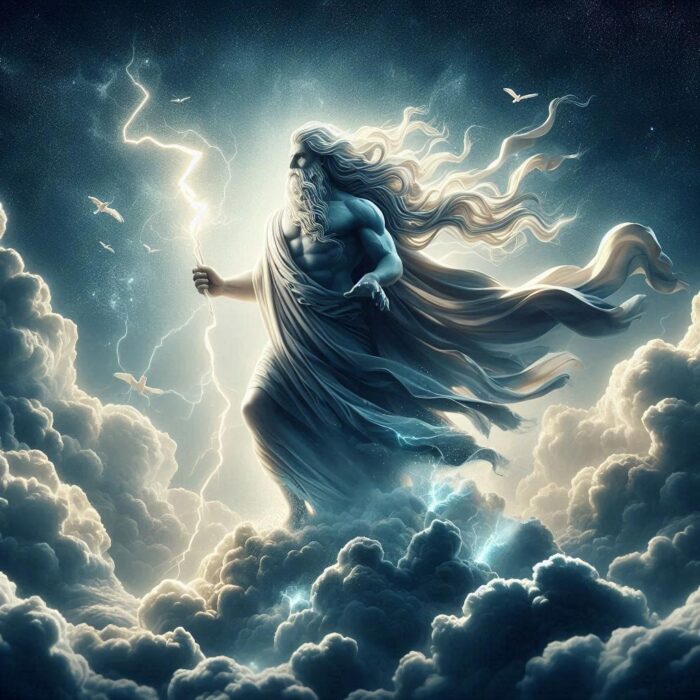

Dias, the king of the gods and ruler of Mount Olympus, presided over the sky and thunder, wielding his powerful thunderbolt to enforce his will.
As the supreme deity, he maintained order among both gods and mortals, ensuring balance and justice in the cosmos.
His role as a protector made him a patron of kings and leaders, often intervening in mortal affairs to set things right or to punish those who overstepped their bounds.
His status as the ultimate authority among the gods came from his victory over the Titans, particularly after he led his siblings in a successful rebellion against their father, Kronos.
Zeus’s domain extended beyond just governance; he was also deeply associated with hospitality and oaths, as well as being the guardian of guests and strangers.
Despite his role as a figure of justice, Zeus’s numerous romantic entanglements were a source of contention, often causing strife among both gods and humans.
His relationships resulted in the birth of many demigods and heroes, including Perseus and Heracles, whose stories intertwine with the broader tapestry of Greek mythology. These affairs often put him at odds with his wife, Hera, leading to many legendary conflicts.
Hera
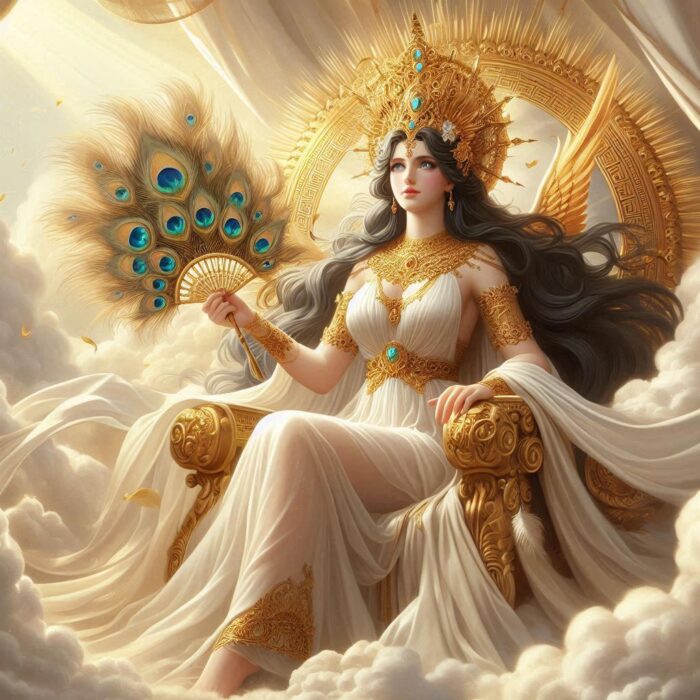

Hera, the sister and wife of Dias, reigned as the queen of the gods. She was the goddess of marriage, family, and childbirth, serving as a guardian of the sanctity of married life and a symbol of maternal care. Unlike other deities, whose domains included the unpredictable aspects of nature, Hera’s power was more focused on the orderly and traditional aspects of life. She held immense influence over the domestic sphere and was a protector of women during childbirth.
However, her marriage to Dias was fraught with turmoil due to his infidelities, which brought out her fiercely jealous nature. Hera’s wrath towards Zeus’s lovers and their offspring became the theme of many myths. For instance, she was relentless in her persecution of Heracles, even sending serpents to kill him as a baby and causing him numerous trials throughout his life.
Despite her stern and vengeful aspects, Hera was revered by the Greeks as a powerful deity who watched over families and upheld social order. In various cities, such as Argos and Samos, her temples were centers of worship, reflecting her status as a major deity within the pantheon.
Poseidon
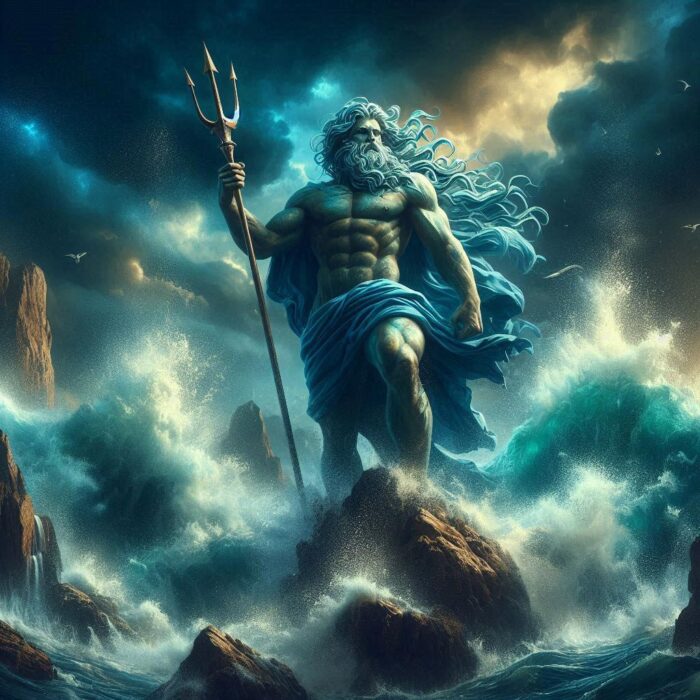

Poseidon, the god of the sea, earthquakes, and horses, was one of the most formidable and unpredictable of the Olympian deities. As the ruler of all waters, he commanded the oceans, seas, rivers, and lakes, wielding his trident to create storms, calm waters, or even cause devastating earthquakes. The Greeks saw Poseidon’s temperament as reflective of the sea itself—sometimes calm and generous, other times violently destructive.
He was both a provider, ensuring safe passage for sailors and abundant fishing, and a punisher, bringing shipwrecks and disasters upon those who displeased him. Poseidon’s influence also extended to land, where he was considered the creator of horses, often depicted alongside these noble animals. He was known to contest other gods for dominion over regions, such as his famous rivalry with Athena over the city of Athens, which he lost after offering the Athenians a saltwater spring while she provided the olive tree.
In mythological narratives, Poseidon played a pivotal role, as seen in the Odyssey, where his wrathful pursuit of Odysseus transformed a journey home into a decade-long ordeal. Though his temperament could be volatile, Poseidon was highly respected and feared by those who depended on the sea for their livelihoods.
Dimitra (Demeter)
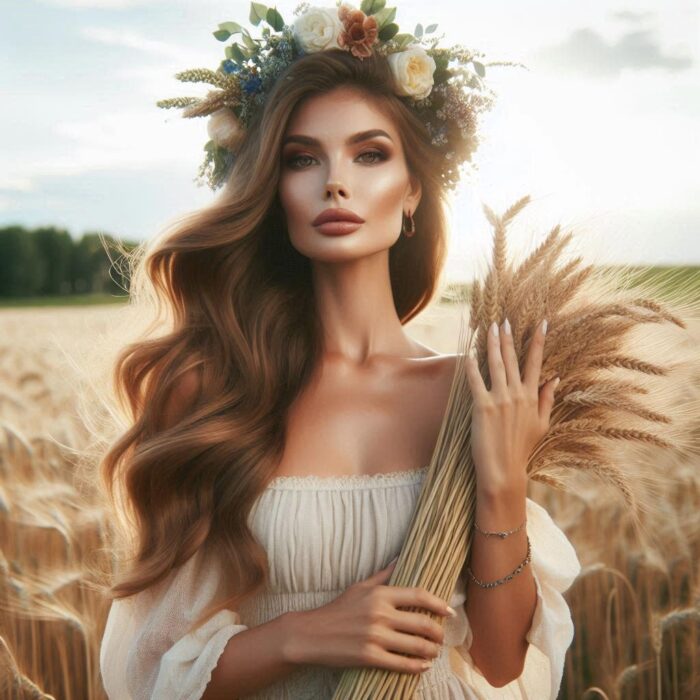

Demeter, the goddess of agriculture, fertility, and the harvest, was central to the survival and prosperity of ancient Greek society. She governed the growth of crops, the fertility of the land, and the cycles of the seasons, making her a key figure in the rhythms of life. Wheat, barley, and corn were her symbols, embodying the agricultural abundance she bestowed upon the earth.
Her connection to the life cycle was embodied in the myth of her daughter Persephone, whose abduction by Hades brought about the changing seasons. Demeter’s grief during Persephone’s time in the underworld caused the earth to become barren, leading to winter, while her joy at her daughter’s return brought forth spring and renewal. This myth, central to the Eleusinian Mysteries, a major religious cult in ancient Greece, emphasized the themes of death and rebirth, and offered initiates promises of a better afterlife.
Demeter’s presence was also tied to rituals of life, death, and fertility, and her worship included sacrifices and ceremonies meant to ensure good harvests and protect against famine. As a motherly figure, she was both nurturing and formidable, embodying the life-sustaining power of the earth and its ability to give and take life.
Athena
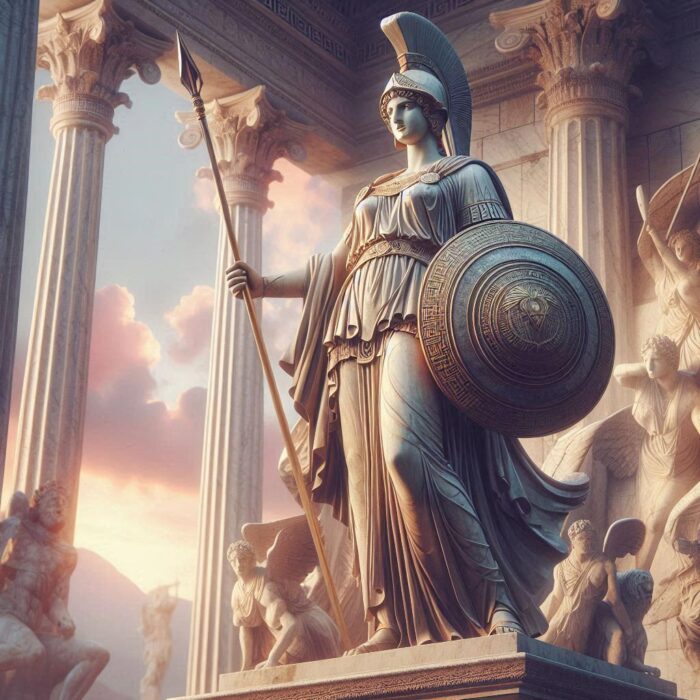

Athena, the goddess of wisdom, warfare, and crafts, was born fully armed from the head of Zeus, symbolizing her role as a deity of intellect and strategic warfare. Unlike her brother Ares, who represented the brutal and chaotic side of war, Athena was known for her tactical acumen, guiding heroes like Odysseus, Perseus, and Heracles to victory through cleverness and strategy.
She was also the patron goddess of Athens, named in her honor after winning a contest against Poseidon. Athena’s wisdom extended beyond the battlefield; she was a goddess of crafts, such as weaving, and a symbol of civilization, law, and justice. Often depicted with an owl and wearing a helmet, she embodied the ideal of rational thought and leadership, making her a favored deity among philosophers and statesmen.
Despite her martial prowess, Athena was also a virgin goddess, representing purity and self-discipline. Her role as a protector of cities and heroes cemented her as one of the most respected and revered figures in Greek mythology, known for her calm demeanor and impartial nature in matters of justice and war.
Apollon (Apollo)
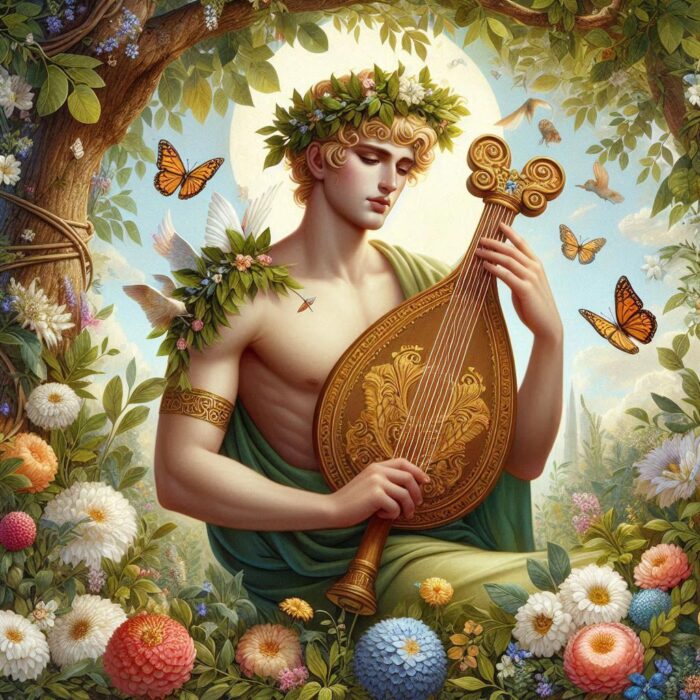

Apollo, the god of the sun, music, poetry, prophecy, and healing, was one of the most versatile and revered deities in the Greek pantheon. As the son of Zeus and Leto, and the twin brother of Artemis, Apollo was often depicted as a youthful and radiant figure, symbolizing beauty and harmony. He rode his chariot across the sky each day, bringing light and warmth to the world, but his influence extended far beyond that of a solar deity.
Apollo was known for his mastery of the lyre, which he used to inspire both gods and mortals with music and poetry. He was also the god of prophecy, with his most famous oracle located at Delphi, where priests and priestesses interpreted his cryptic messages. These oracles played a significant role in guiding the decisions of individuals and city-states, making Apollo a god of wisdom and foresight.
His dual nature as a healer and bringer of plague highlighted his power over life and death. While he could cure diseases and bring relief through his knowledge of medicine, he could also unleash devastating plagues with his arrows. Apollo’s complexity and cultural significance made him a central figure in many myths, ranging from his tragic love affairs, like that with the nymph Daphne, to his role as a divine protector of Troy during the Trojan War.
Artemis
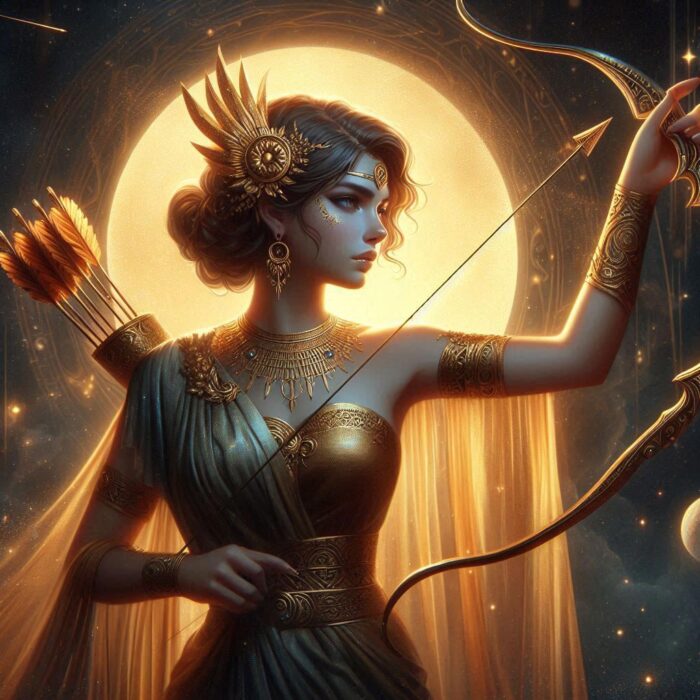

Artemis, Apollo’s twin sister, was the goddess of the hunt, wilderness, and childbirth, as well as a protector of young women. She roamed the forests and mountains with her band of nymphs, wielding her silver bow and arrows with unmatched skill. Artemis was often depicted as a virgin huntress, fiercely independent and unwilling to be tied down, representing the untamed and free aspects of nature.
As a protector of animals and nature, Artemis held sway over wild creatures and the moon, guiding hunters and ensuring balance in the natural world. She was also associated with childbirth and the safety of women during labor, highlighting her role as a nurturing yet fierce guardian. This duality made her both a goddess of life, safeguarding the young and the vulnerable, and a bringer of swift retribution to those who defied her or threatened her purity.
Ares
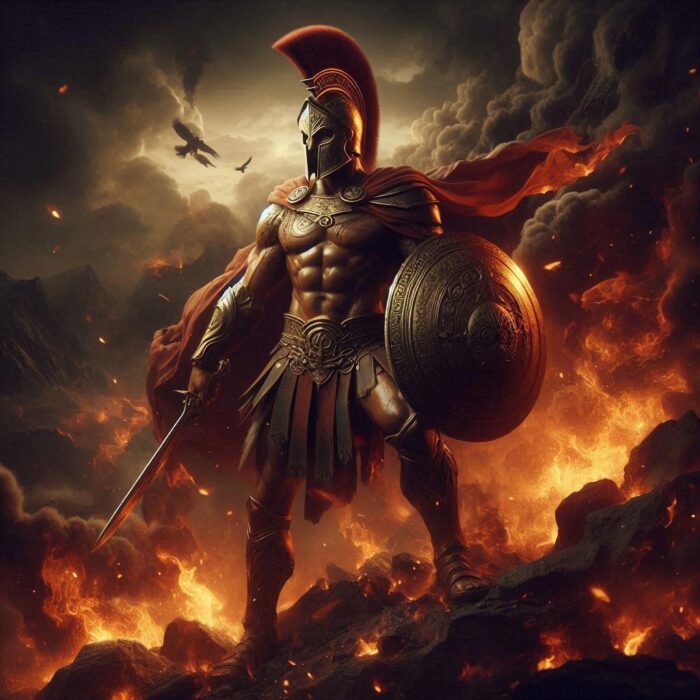

Ares, god of war, embodied the brutal, chaotic, and bloodthirsty side of battle. Unlike Athena’s strategic wisdom, he thrived in raw violence and chaos, often depicted as a fierce warrior stirring fear and fury on the battlefield.
Despite his power, he lacked favor among gods, including his father Zeus, who saw him as reckless and destructive. Few temples honored him compared to other gods.
His love affair with Aphrodite blended love and war, adding complexity to his character.
In myths, Ares often faced defeat or capture, reminding Greeks of war’s uncontrollable, destructive nature.
Aphrodite


Aphrodite, goddess of love, beauty, and desire, wielded irresistible power over gods and mortals. Born from sea foam near Cyprus, she embodied physical beauty and attraction’s mysteries.
Her influence extended beyond romance to all passion—marriage, seduction, and chaotic desire.
Her role in myths like the Trojan War, sparked by the golden apple of beauty, highlights her importance. Married to Hephaestus but unfaithful with Ares, her affairs caused jealousy and rivalry among gods.
Yet, Aphrodite blessed lovers, fostering harmony, and ruled over art, music, and sensual pleasures—forces binding the universe.
Hephaestos
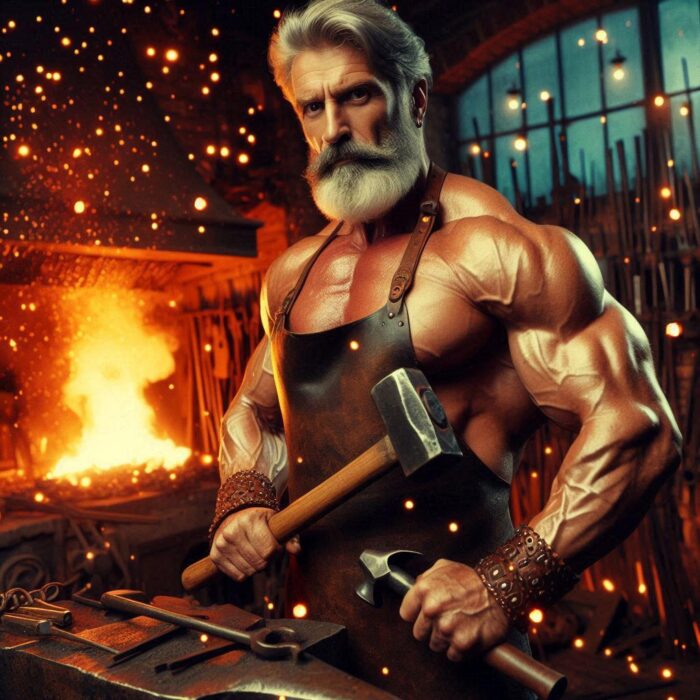

Hephaestos, god of fire, metalworking, and craftsmanship, was the divine smith forging weapons and art for gods. Despite being lame from birth or after a fall from Olympus, his skill was unmatched.
He made Zeus’s thunderbolts, Achilles’ armor, and Prometheus’s chains, central to divine order.
His workshop beneath volcanoes symbolized fire’s power and danger. Cyclopes often assisted him.
Married to Aphrodite, their contrast symbolized art and nature’s complex interplay.
Though less majestic, Hephaestos was revered by artisans and laborers as a master of fire’s transformative power.
Hermes
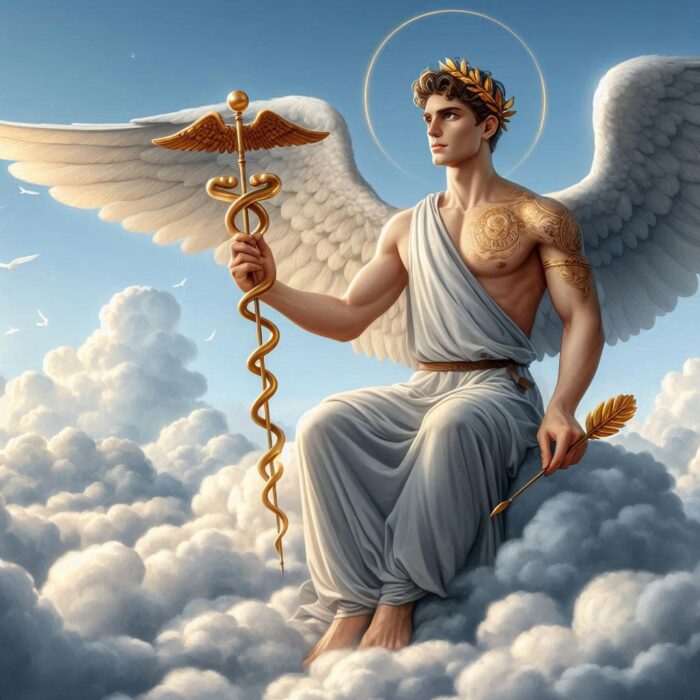

Hermes, fleet-footed messenger of the gods, ruled communication, commerce, and travel. With winged sandals and caduceus, he moved freely between gods and mortals, guiding souls to the underworld and delivering messages.
Protector of travelers and merchants, associated with trade, luck, and persuasion.
Also a trickster, known for cunning—for example, stealing Apollo’s cattle as a child but cleverly avoiding punishment.
Despite mischief, Hermes helped heroes like Odysseus and Perseus, also guiding souls in the afterlife.
Dionysos
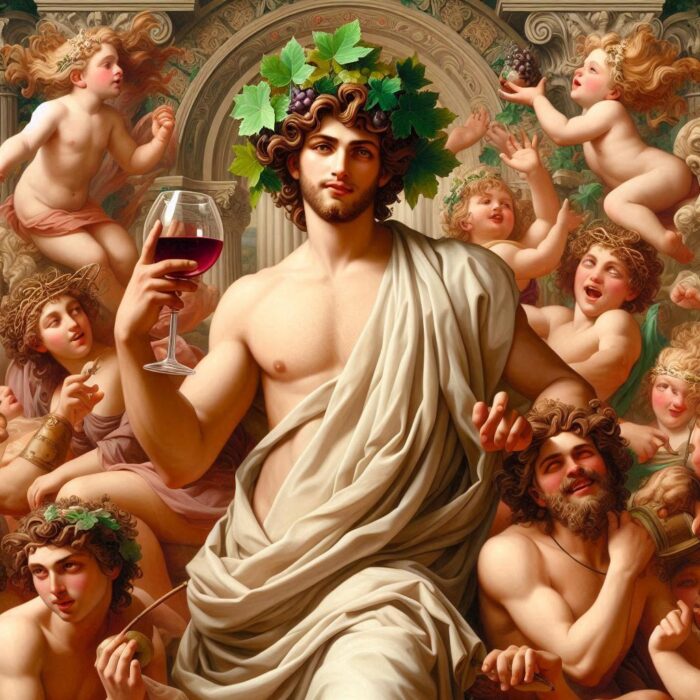

Dionysos, god of wine, ecstasy, and revelry, represented nature’s liberating forces and intoxication’s transformative power.
Born of Zeus and mortal Semele, he blurred the lines between divine and earthly.
Spreading viticulture and wine mysteries, he inspired joy, madness, and divine connection.
His rites, the Dionysian Mysteries, allowed breaking societal norms to commune with the divine—both creative inspiration and chaotic frenzy.
Followers included satyrs and maenads, wild and ecstatic figures.
Despite chaos, Dionysos symbolized rebirth and regeneration, like the annual grapevine cycle.
Main gods not living in Olympus
Hestia
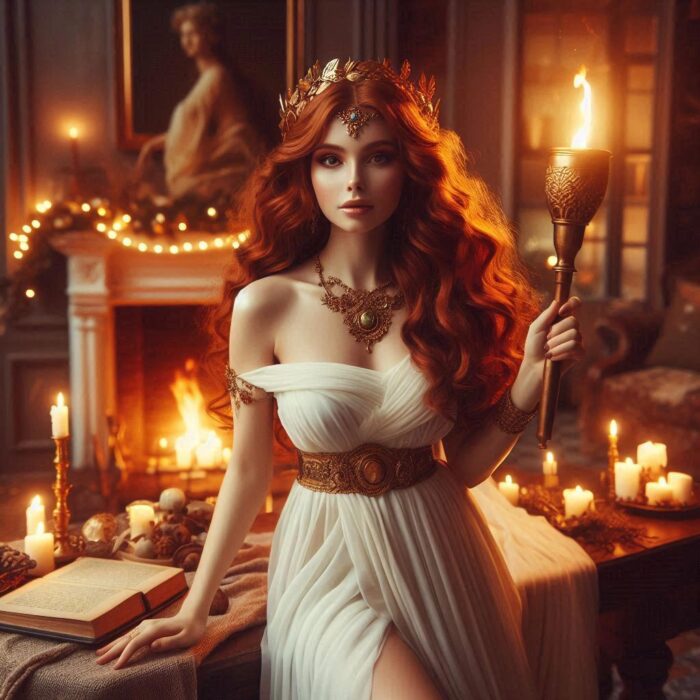

Hestia, goddess of hearth, home, and domesticity, held a unique place among Olympians. She stepped down for Dionysos to keep the number twelve but remained deeply revered.
Keeper of the sacred flame, symbolizing household stability and communal harmony.
Every Greek home honored her with offerings, representing hospitality and reverence.
A virgin goddess like Athena and Artemis, emphasizing a nurturing yet independent spirit.
Though less dramatic, Hestia’s influence was central to family and state well-being, with her eternal flame a symbol of unity.
Hades
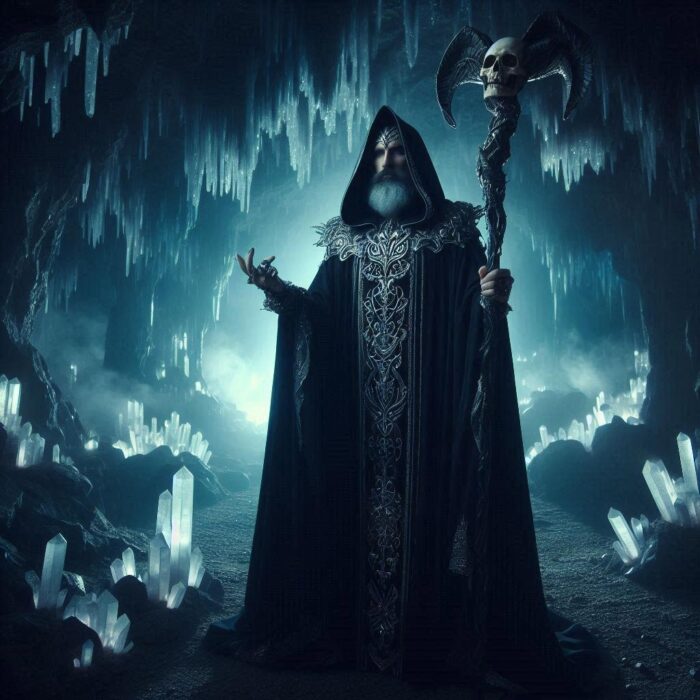

Hades, god of the underworld, ruled the realm of the dead with stern justice, one of the most feared and misunderstood Greek gods.
Brother to Zeus and Poseidon, he claimed the underworld after the Titan defeat—a shadowy domain far from Olympus’s light.
His kingdom wasn’t just torment but a complex afterlife with different regions for souls. The River Styx formed a boundary, with Charon ferrying souls across.
Hades ruled alongside Persephone, abducted from the living world, explaining the seasons.
Though grim, he wasn’t evil—just a necessary part of life and death’s cycle.
Called “Plouton” (the wealthy one) for earth’s hidden riches, he symbolized both death’s finality and fertility through buried treasures.
Few temples existed, as Greeks feared invoking him, but he was respected as the order’s guardian between the living and the dead.
Summary: Why the Greek Gods Still Matter
The Greek pantheon remains relevant because it captures the complexity of existence through relatable, imperfect divine figures. Whether it’s Dias’s authority, Athena’s wisdom, or Dionysos’s wild abandon, these gods show us the many faces of power and passion.
They remind us that life is a mix of order and chaos, creation and destruction, light and shadow. Their myths explain natural phenomena, cultural values, and ethical dilemmas — lessons that resonate even in modern times.
While we may no longer light sacred flames or consult oracles, the stories of the Greek gods continue to inspire literature, art, psychology, and popular culture. They serve as a mirror reflecting our struggles, strengths, and dreams — an evergreen source of meaning that transcends time.
So whether you’re a history buff, a mythology fan, or simply curious about how ancient Greeks saw their world, diving into the tales of these gods is a journey into the roots of Western thought and storytelling.
Note: All photos are created using AI, as we were unable to settle an interview with all the gods. We did our best and tried, but Zeus never answered the call, and the others seemed to be very busy. So, forgive us for presenting the fruits of AI. You’ll be seeing a lot of AI images in the future anyway, so don’t complain!


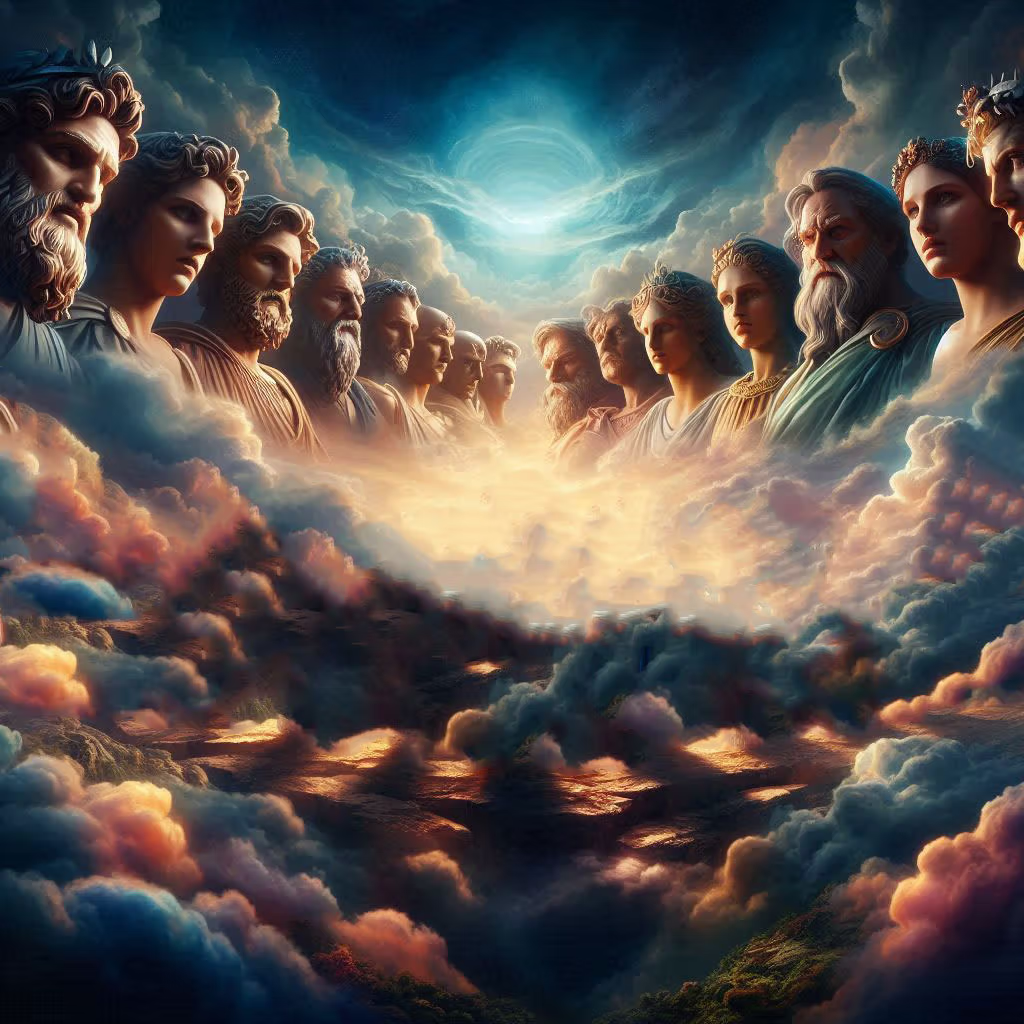


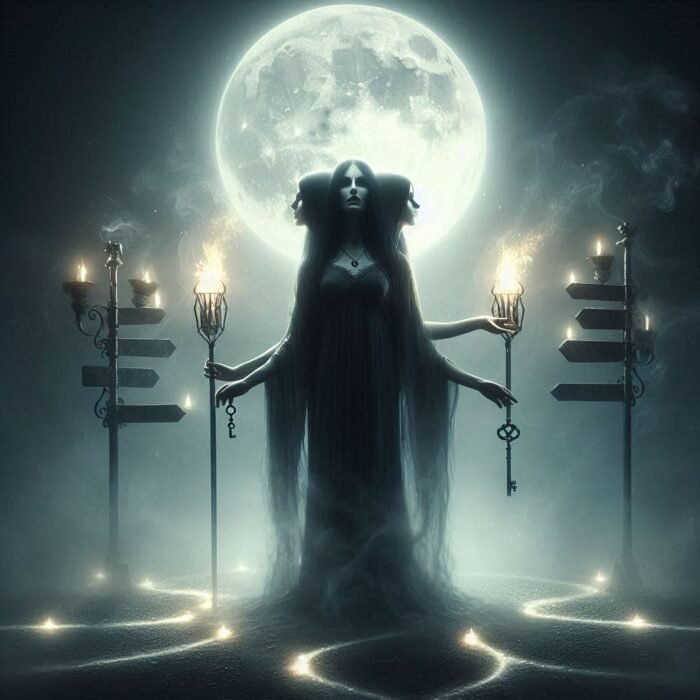
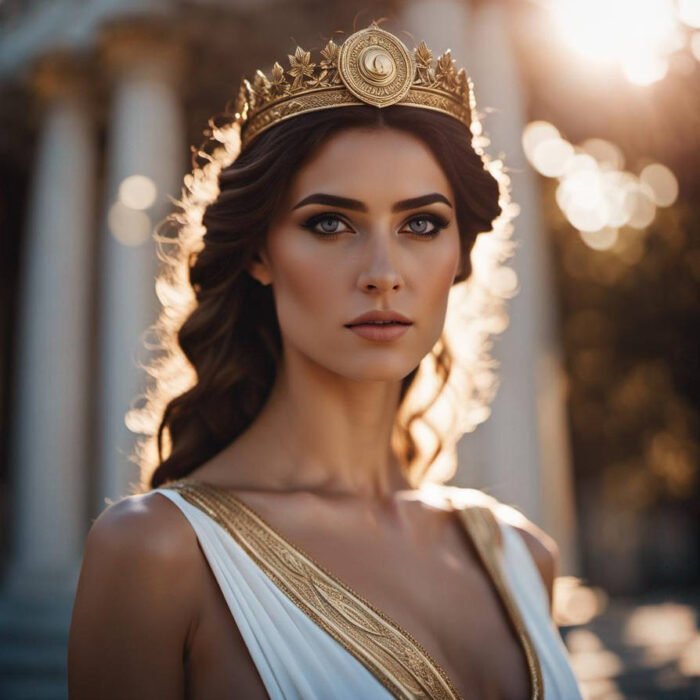
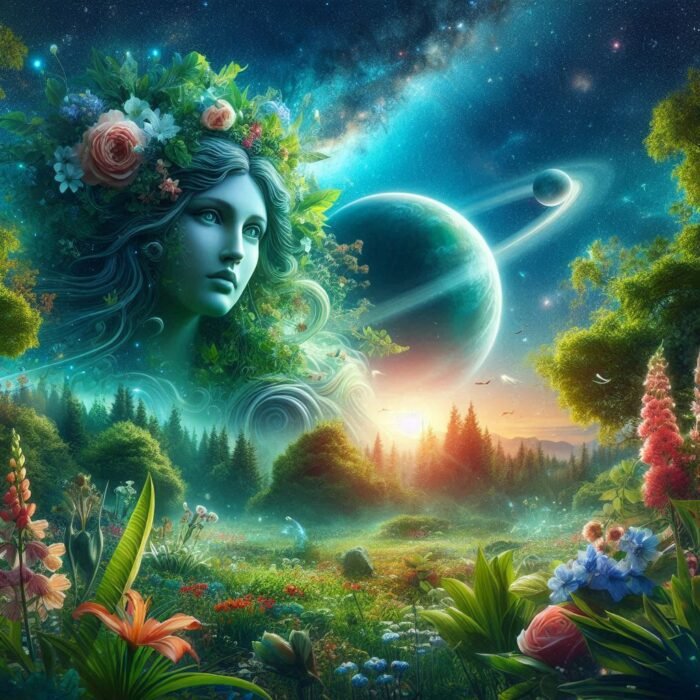
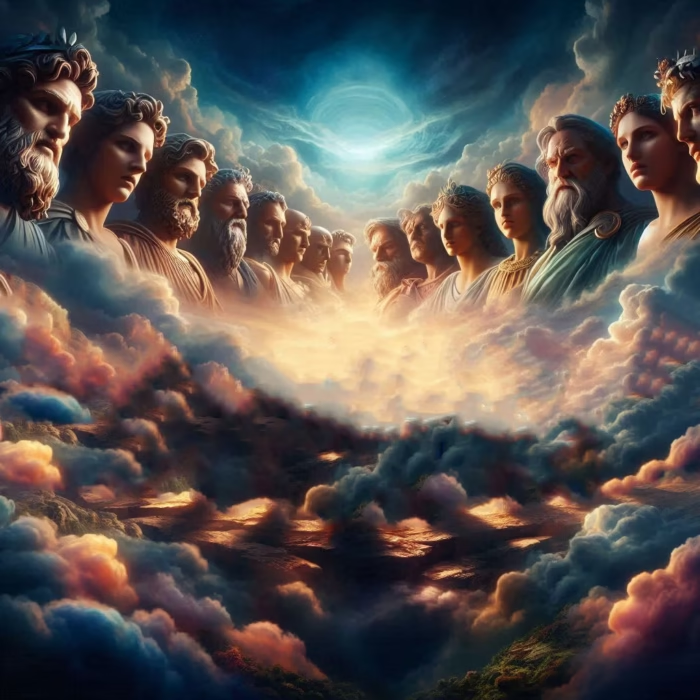
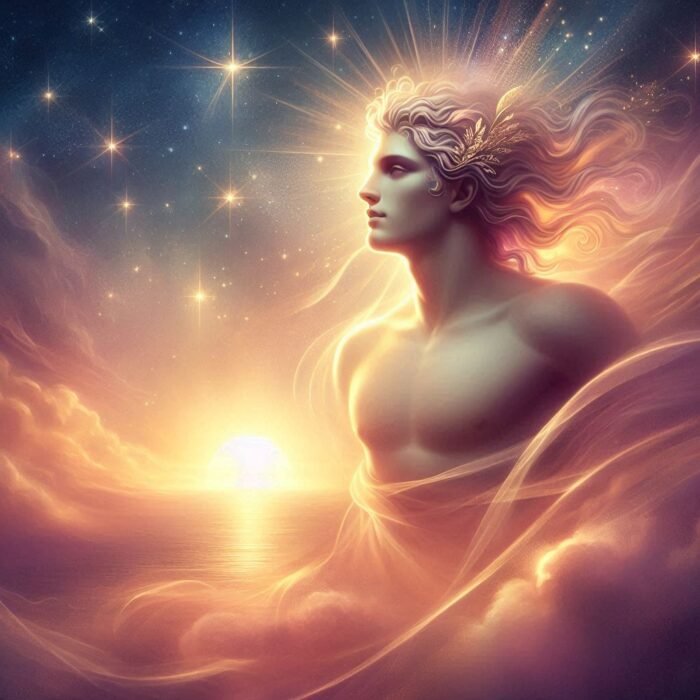
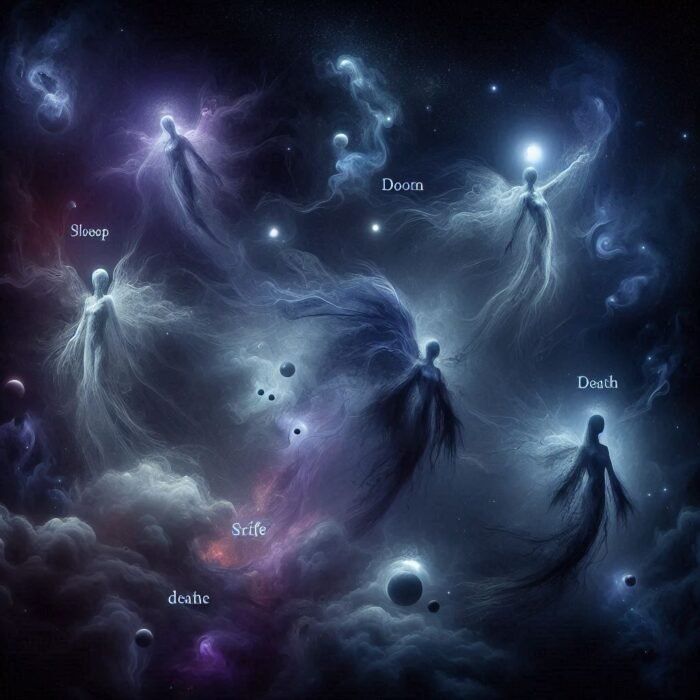


Comments